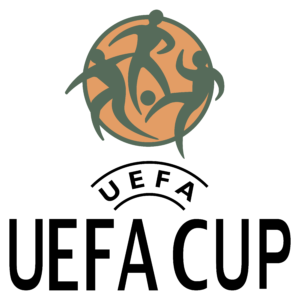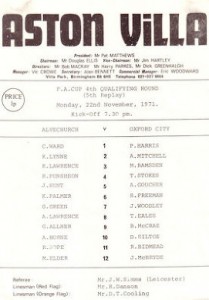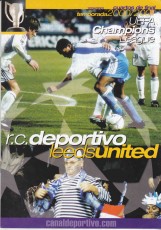 Back in September 2019, A Tournament Frozen in Time – The Wonderful Randomness of the European Cup Winners’ Cup, was released by Pitch Publishing, written by Steven Scragg. It was so well received and praised that it was nominated within the football category for The Telegraph Sports Books Awards 2020. Now just a year on the author has followed this up with another nod to European tournaments past, this time focusing on the UEFA Cup, which for readers of a younger age has become butchered to emerge Frankenstein-like as the Europa League, a bloated and poor relation of the money-driven, self-centred tournament that is the UEFA Champions League.
Back in September 2019, A Tournament Frozen in Time – The Wonderful Randomness of the European Cup Winners’ Cup, was released by Pitch Publishing, written by Steven Scragg. It was so well received and praised that it was nominated within the football category for The Telegraph Sports Books Awards 2020. Now just a year on the author has followed this up with another nod to European tournaments past, this time focusing on the UEFA Cup, which for readers of a younger age has become butchered to emerge Frankenstein-like as the Europa League, a bloated and poor relation of the money-driven, self-centred tournament that is the UEFA Champions League.
This second offering, which is as excellent a read as the Cup Winners’ Cup book, is spread over twelve chapters, with an Acknowledgment, Introduction and Afterword, bookending them. In terms of the UEFA Cup years, Scragg focuses on the two-legged Finals, which took place from 1971/72 (with Spurs the first winners) through to 1996/97 (when Schalke 04 lifted the trophy), a feature which set the competition apart from the European Cup and Cup Winners’ Cup at the time.
As with the A Tournament Frozen in Time book, this is not plod through the various seasons in timeline fashion, but a series of wonderfully researched chapters that provide context in relation to the history and stories of the competition in terms of the countries and teams that took part. Before the author gets into those specifics, the opening chapter The Inter-Cities Fairs Cup and the Dawning of the UEFA Cup, provides background into the history of the Fairs Cup, which despite bearing more resemblance to the UEFA Cup is not recognised by UEFA itself. It’s a particularly strange stance, when you consider that the UEFA Cup bears little similitude to the Europa League, but is acknowledged by UEFA as its natural predecessor, with even the same trophy presented in its current guise.
Of the main body of the book, the chapters detail the various periods of certain countries involvement, with for instance, A Very English Handover, looking at Spurs and Liverpool in the early years of the tournament, with further English success from Ipswich Town detailed in the chapter, Tractor Beam. Whilst English clubs had their moments, Scragg skilfully details the other chapters to reflect the impact of the other main European football powers such as Germany, Italy, Netherlands and Spain, and ‘cool’ sides such as the Swedes IFK Göteborg.
 As with the Cup Winners’ Cup, changes to the UEFA Cup came about through the breakup of the former Communist bloc, necessitating the introduction of a Preliminary Round to the competition. With the two-legged Finals gone in 1996/97 the first steps of change arrived, as the Final morphed into a one-off game at a neutral venue. Further transformation came with the Cup Winners’ Cup demise at the end of 1998/99, and the Groups Stages established in the competition in 2004/05, with the ‘rebrand’ complete in 2009/10. Part of this includes those clubs failing to qualify for the Champions League knock-out stages dropping into the Europa League, which as Scragg acknowledges gives the impression of it being a second-rate competition. As he so brilliantly puts it, “essentially the Europa League is the MK Dons of European club football tournaments. There is a sad sense of franchise about it.”
As with the Cup Winners’ Cup, changes to the UEFA Cup came about through the breakup of the former Communist bloc, necessitating the introduction of a Preliminary Round to the competition. With the two-legged Finals gone in 1996/97 the first steps of change arrived, as the Final morphed into a one-off game at a neutral venue. Further transformation came with the Cup Winners’ Cup demise at the end of 1998/99, and the Groups Stages established in the competition in 2004/05, with the ‘rebrand’ complete in 2009/10. Part of this includes those clubs failing to qualify for the Champions League knock-out stages dropping into the Europa League, which as Scragg acknowledges gives the impression of it being a second-rate competition. As he so brilliantly puts it, “essentially the Europa League is the MK Dons of European club football tournaments. There is a sad sense of franchise about it.”
Goodness knows then what is to be made of the Europa Conference League scheduled to begin in 2021/22. That will take UEFA back up to three European club competitions; this reader for one would prefer a return to the three we used to have along with all their individual character, warts and all. Nostalgic days indeed.
There is an old football adage that goes, ‘never change a winning side’, and given the success and praise for Scragg’s Cup Winners’ Cup book, he has stuck to the winning formula once again and doesn’t disappoint. With the Cup Winners’ Cup and UEFA Cup books completed, will Scragg go for the hat-trick and complete a majestic Trinity with a look at the glory years of the European Cup? It will be a treat indeed if this comes to pass.
(Pitch Publishing Ltd. October 2020. Hardback 255pp)
 The Conquerors charts the rise, fall and resurgence of AC Milan across one of the club’s most legendary eras.
The Conquerors charts the rise, fall and resurgence of AC Milan across one of the club’s most legendary eras. Dundee were the punch-drunk underdogs when they chased European Cup glory after winning the league in 1962. AC Milan, Benfica and Real Madrid were at the peak of their powers and Ipswich would represent England after winning the league under Alf Ramsey. Dundee were about to enter a new world of glamour.
Dundee were the punch-drunk underdogs when they chased European Cup glory after winning the league in 1962. AC Milan, Benfica and Real Madrid were at the peak of their powers and Ipswich would represent England after winning the league under Alf Ramsey. Dundee were about to enter a new world of glamour.
 Back in September 2019,
Back in September 2019,  As with the Cup Winners’ Cup, changes to the UEFA Cup came about through the breakup of the former Communist bloc, necessitating the introduction of a Preliminary Round to the competition. With the two-legged Finals gone in 1996/97 the first steps of change arrived, as the Final morphed into a one-off game at a neutral venue. Further transformation came with the Cup Winners’ Cup demise at the end of 1998/99, and the Groups Stages established in the competition in 2004/05, with the ‘rebrand’ complete in 2009/10. Part of this includes those clubs failing to qualify for the Champions League knock-out stages dropping into the Europa League, which as Scragg acknowledges gives the impression of it being a second-rate competition. As he so brilliantly puts it, “essentially the Europa League is the MK Dons of European club football tournaments. There is a sad sense of franchise about it.”
As with the Cup Winners’ Cup, changes to the UEFA Cup came about through the breakup of the former Communist bloc, necessitating the introduction of a Preliminary Round to the competition. With the two-legged Finals gone in 1996/97 the first steps of change arrived, as the Final morphed into a one-off game at a neutral venue. Further transformation came with the Cup Winners’ Cup demise at the end of 1998/99, and the Groups Stages established in the competition in 2004/05, with the ‘rebrand’ complete in 2009/10. Part of this includes those clubs failing to qualify for the Champions League knock-out stages dropping into the Europa League, which as Scragg acknowledges gives the impression of it being a second-rate competition. As he so brilliantly puts it, “essentially the Europa League is the MK Dons of European club football tournaments. There is a sad sense of franchise about it.” For me the reasons for the change in perspective of the FA Cup lay across the football community. The FA itself is complicit in damaging the competition in a number of ways. Firstly, there was the decision to allow Manchester United to opt out of the 1999/2000 FA Cup to take part in the revamped World Club Competition. This decision was part of the political gamble by the FA at the time, as they tried to sway FIFA in awarding England the hosting of the 2006 World Cup. And we all know how that worked out. Secondly, there was the ruling to have ties settled after a single replay (excluding the Semi-Final and Final itself). Personally, a major part of the glamour and thrill of the Cup was the odd occasions when a particular tie within a round went to a number of replays. As a Fulham fan I remember vividly the 1974/75 Cup run when we played Hull City three times to get through the Third Round and Nottingham Forest an incredible four times to make it through the Fourth Round. However, those Fulham fixtures were nothing compared to the record breaking fixture in 1971/72. Alvechurch played Oxford City in the 4th Qualifying Round. It required six games before Alvechurch emerged 1-0 winners. Sadly epic battles like that are a thing of the past. Thirdly, because of the burden of rebuilding Wembley Stadium, Semi-Finals now take place at the famous ground. This in my opinion also works to devalue the competition as the act of making it to Wembley and the Final are cheapened. Reaching a Final should be special. Certainly for me in 1975 seeing Fulham in the Final (despite defeat) was and is a treasured memory.
For me the reasons for the change in perspective of the FA Cup lay across the football community. The FA itself is complicit in damaging the competition in a number of ways. Firstly, there was the decision to allow Manchester United to opt out of the 1999/2000 FA Cup to take part in the revamped World Club Competition. This decision was part of the political gamble by the FA at the time, as they tried to sway FIFA in awarding England the hosting of the 2006 World Cup. And we all know how that worked out. Secondly, there was the ruling to have ties settled after a single replay (excluding the Semi-Final and Final itself). Personally, a major part of the glamour and thrill of the Cup was the odd occasions when a particular tie within a round went to a number of replays. As a Fulham fan I remember vividly the 1974/75 Cup run when we played Hull City three times to get through the Third Round and Nottingham Forest an incredible four times to make it through the Fourth Round. However, those Fulham fixtures were nothing compared to the record breaking fixture in 1971/72. Alvechurch played Oxford City in the 4th Qualifying Round. It required six games before Alvechurch emerged 1-0 winners. Sadly epic battles like that are a thing of the past. Thirdly, because of the burden of rebuilding Wembley Stadium, Semi-Finals now take place at the famous ground. This in my opinion also works to devalue the competition as the act of making it to Wembley and the Final are cheapened. Reaching a Final should be special. Certainly for me in 1975 seeing Fulham in the Final (despite defeat) was and is a treasured memory. During Leeds United’s amazing run to the semi-finals of the Champions’ League in 2000/2001 one moment stood out in particular. The choice might seem strange with so much to pick from. It was, perhaps surprisingly, not a goal, not even Dom Matteo’s effing great goal in the San Siro and it wasn’t a great tackle by a Leeds defender, a goal-line clearance, a stunning save or that blooper by A.C. Milan’s goalie that allowed Bowyer’s 89th minute shot through. There were plenty of all these great memories which have since been firmly absorbed into United’s folklore.
During Leeds United’s amazing run to the semi-finals of the Champions’ League in 2000/2001 one moment stood out in particular. The choice might seem strange with so much to pick from. It was, perhaps surprisingly, not a goal, not even Dom Matteo’s effing great goal in the San Siro and it wasn’t a great tackle by a Leeds defender, a goal-line clearance, a stunning save or that blooper by A.C. Milan’s goalie that allowed Bowyer’s 89th minute shot through. There were plenty of all these great memories which have since been firmly absorbed into United’s folklore.